The AMD Ryzen Threadripper 1950X and 1920X Review: CPUs on Steroids
by Ian Cutress on August 10, 2017 9:00 AM ESTCPU Encoding Tests
One of the interesting elements on modern processors is encoding performance. This includes encryption/decryption, as well as video transcoding from one video format to another. In the encrypt/decrypt scenario, this remains pertinent to on-the-fly encryption of sensitive data - a process by which more modern devices are leaning to for software security. Video transcoding as a tool to adjust the quality, file size and resolution of a video file has boomed in recent years, such as providing the optimum video for devices before consumption, or for game streamers who are wanting to upload the output from their video camera in real-time. As we move into live 3D video, this task will only get more strenuous, and it turns out that the performance of certain algorithms is a function of the input/output of the content.
All of our benchmark results can also be found in our benchmark engine, Bench.
7-Zip 9.2: link
One of the freeware compression tools that offers good scaling performance between processors is 7-Zip. It runs under an open-source licence, is fast, and easy to use tool for power users. We run the benchmark mode via the command line for four loops and take the output score.
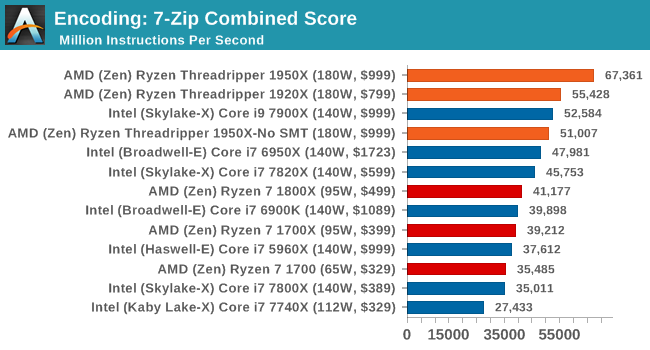
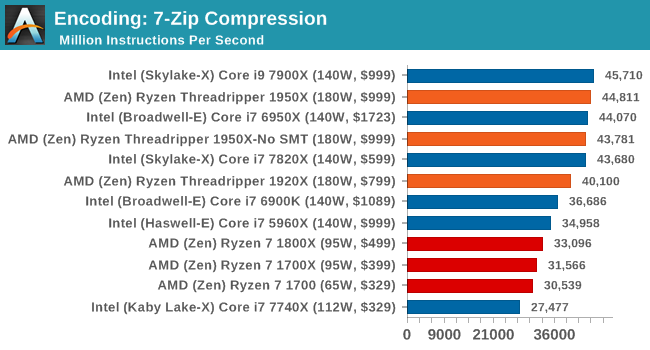
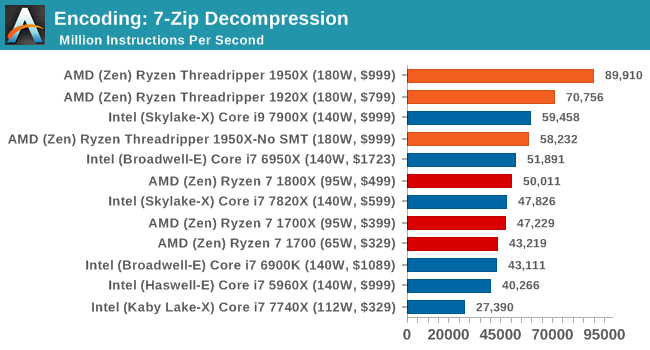
At the request of a few users, we've gone back through our saved benchmark data and pulled out compression/decompression numbers for 7-zip. AMD clearly makes a win here in decompression by a long way.
WinRAR 5.40: link
For the 2017 test suite, we move to the latest version of WinRAR in our compression test. WinRAR in some quarters is more user friendly that 7-Zip, hence its inclusion. Rather than use a benchmark mode as we did with 7-Zip, here we take a set of files representative of a generic stack (33 video files in 1.37 GB, 2834 smaller website files in 370 folders in 150 MB) of compressible and incompressible formats. The results shown are the time taken to encode the file. Due to DRAM caching, we run the test 10 times and take the average of the last five runs when the benchmark is in a steady state.
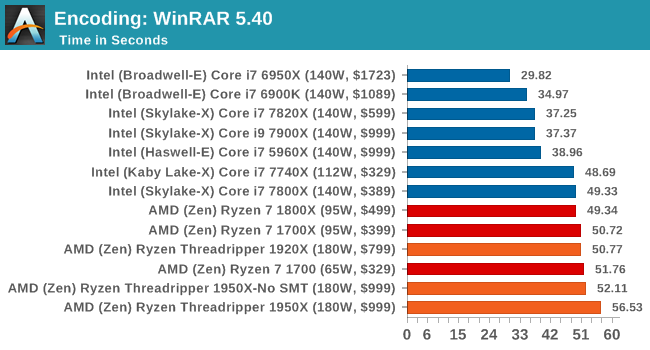
WinRAR encoding is another test that doesn't scale up especially well with thread counts. After only a few threads, most of its MT performance gains have been achieved. Which isn't a help to Threadripper, and is outright a hiderence in Creator Mode.
AES Encoding
Algorithms using AES coding have spread far and wide as a ubiquitous tool for encryption. Again, this is another CPU limited test, and modern CPUs have special AES pathways to accelerate their performance. We often see scaling in both frequency and cores with this benchmark. We use the latest version of TrueCrypt and run its benchmark mode over 1GB of in-DRAM data. Results shown are the GB/s average of encryption and decryption.
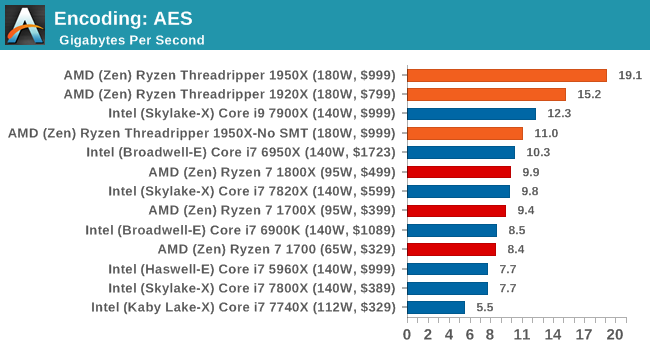
HandBrake v1.0.2 H264 and HEVC: link
As mentioned above, video transcoding (both encode and decode) is a hot topic in performance metrics as more and more content is being created. First consideration is the standard in which the video is encoded, which can be lossless or lossy, trade performance for file-size, trade quality for file-size, or all of the above can increase encoding rates to help accelerate decoding rates. Alongside Google's favorite codec, VP9, there are two others that are taking hold: H264, the older codec, is practically everywhere and is designed to be optimized for 1080p video, and HEVC (or H265) that is aimed to provide the same quality as H264 but at a lower file-size (or better quality for the same size). HEVC is important as 4K is streamed over the air, meaning less bits need to be transferred for the same quality content.
Handbrake is a favored tool for transcoding, and so our test regime takes care of three areas.
Low Quality/Resolution H264: Here we transcode a 640x266 H264 rip of a 2 hour film, and change the encoding from Main profile to High profile, using the very-fast preset.
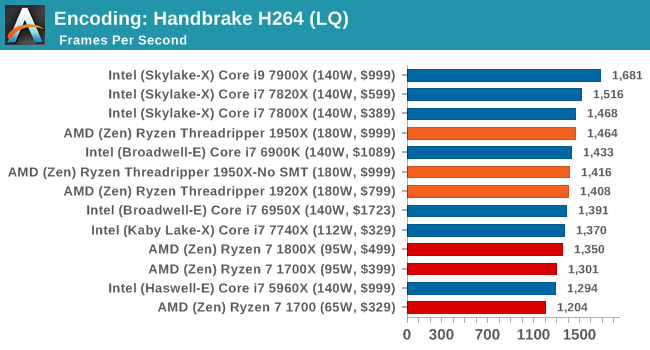
High Quality/Resolution H264: A similar test, but this time we take a ten-minute double 4K (3840x4320) file running at 60 Hz and transcode from Main to High, using the very-fast preset.
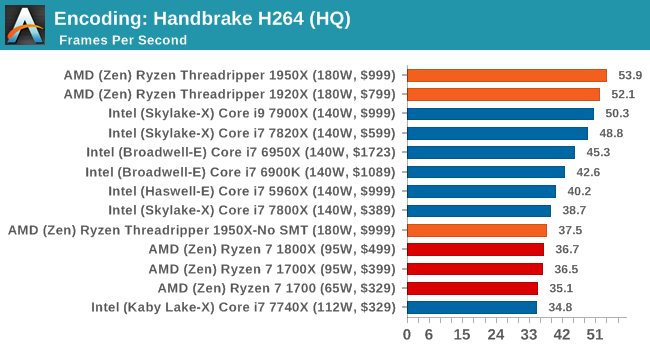
HEVC Test: Using the same video in HQ, we change the resolution and codec of the original video from 4K60 in H264 into 4K60 HEVC.
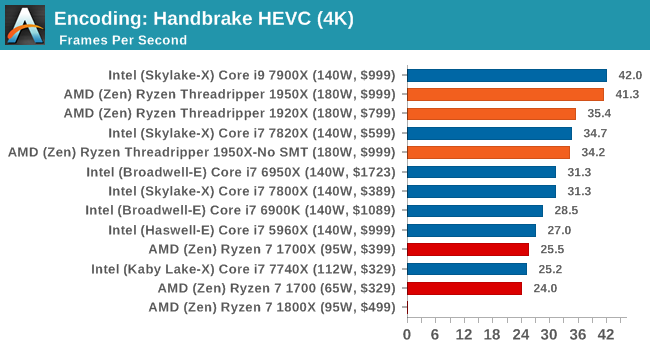
In the HQ H264 test, AMD pushes ahead with both the processors, while SMT-off severely limits the 1950X due to the lack of SMT threads. As we move to HEVC though, the 1950X and 7900X clash on performance.










347 Comments
View All Comments
coolhardware - Saturday, August 12, 2017 - link
Hi B3an, what will you primarily be using your 1950X for?I do not really have the workload to justify that CPU, but I wish I did ;-)
Mugur - Sunday, August 13, 2017 - link
I suggest you to read other TR reviews. Some were testing GPU rendering and they show that even in this case you need the best cpu you can get.minde - Saturday, August 12, 2017 - link
i see in foto on amd processor MADE IN CHINA . without comment. what differencebetween intel and amd quality , class
mr_tawan - Saturday, August 12, 2017 - link
TSMC perhaps?tuxRoller - Saturday, August 12, 2017 - link
I'm very curious as to how this will perform with smt enabled and numa being exposed.franzeal - Saturday, August 12, 2017 - link
On page 1, does Ryzen use an AMD implementation of SMT or hyper-threading (i.e. licensed from Intel). I've been under the impression it's the former, and referring to SMT as hyper-threading in this instance is incorrect. Intel's was not the first or the only way to implement SMT.Oxford Guy - Saturday, August 12, 2017 - link
When you went with 2400 speed RAM to slow down TR you forgot to make it single channel.franzeal - Saturday, August 12, 2017 - link
Error in Dolphin benchmark description: "Results are given in minutes, where the Wii itself scores 17.53 minutes." should be results are given in seconds.franzeal - Saturday, August 12, 2017 - link
On the last page it states "On the side of the 1920X, users will again see more cores, ECC support, and over double the number of PCIe lanes compared to the Core i7-7820X for $100 difference."According to the accompanying chart it's a ~$200 difference. Either the chart is wrong or that statement.
quadi9 - Saturday, August 12, 2017 - link
I picked up an I9-7900x at a local Micro Center for $899 this week. And it is running stable at 4.6 GHZ. How well does the Ryzen overclock? My Blender BMW score was 181 seconds. Just opened the file and clicked Render.